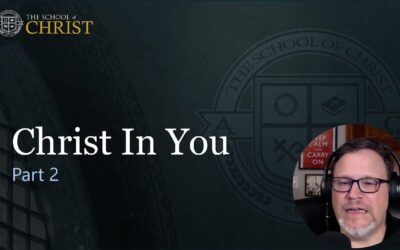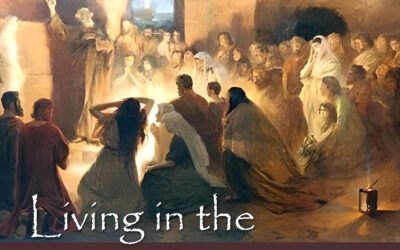At first, prayer is all about “me.” My needs, wants, wishes, desires, and plans. Getting God to give me what I want. Then, wondering what’s wrong with God when things don’t go the way I want them to go. We think that the perfect prayer, perfectly recited and perfectly repeated, obligates God to do what we want.
Some more advanced applications of prayer are just sophisticated forms of manipulation and control. The Bible is used like a book of magical incantations. We quote Scriptures and expect God to perform miracles on demand. Just as bad, we use prayer as a way to get other people “straight” – my irritable spouse, my rebellious kids, my idiot neighbors, my stupid boss – they all need straightening out, and prayer becomes a passive-aggressive weapon of choice. We see clearly what needs to happen (so we think), and we use prayer as a spiritual sledgehammer to bring other people around to our point of view. It makes us feel good that God is “on our side” and is working behind the scenes to jerk a knot in these people. The best you can say about this kind of prayer is that it is on the level of white witchcraft, which is really the same as black magic except it uses God instead of the devil to get its own way.
Well then, how should we pray?
I’ve asked myself that question at various times over the last twenty years or so. As I grow in a Christ-centered faith, I find that my prayers continue to lose their self-centered focus. I am not fully there yet, but I’m making progress. Of course, we all have needs and we should ask in order to receive. But there is a height and depth of prayer that goes beyond getting our needs met.
Jesus gave us a new way to pray, and He contrasted His approach with the way the heathen approach God – that is to say, the heathen pray but have no idea who they are talking to. Not much different than the way religious folks approach prayer.
Here are four benefits to learning how to pray this “new” way.
- Alignment. The primary purpose of prayer is to get aligned with the heart, mind, and will of God. “Your Kingdom come, Your Will be done, on earth as it is in heaven.” His Will, not my will. We can tack this onto the end of our self-centered prayers to make them sound more acceptable; but if we truly understand what these words mean then they will change the way we pray. Prayer is not about getting fulfillment, but about denial; we let go of our agenda and we align ourselves with God’s purpose. In my experience, this is not accomplished in a single session of prayer. Instead, it is an attitude alignment that takes place over many seasons. Religion has trained us to go to God when we have a need and boldly ask for the things we want. The Christ-centered approach is more about letting go than hanging on. It’s not about trying to get God aligned with what I want Him to do, but finding out what God wants to do, and getting myself aligned with Him. So look at how and why you pray and ask yourself what is happening: are you trying to take control, or give control? Are you attempting to bend God to your will, or are bending yourself to Him?
- Adjustment. We come into prayer the way we come into every other religious activity – with a lot of preconceived ideas, stereotypes, traditions, biases and illusions about what’s true and what’s not true. We like to think the truth is on our side, that we see everything clearly, that we know exactly what’s what, and that we are informed enough to tell God what needs to be done. The more I pray, the more I realize how little I know and how much He knows. This saves a lot of wasted breath trying to educate God about my situation, or tell God what’s going on. He knows! I’m the one who doesn’t know. So again, we can come to the Lord with an attitude of instructing Him, or we can come with a humble, teachable attitude that is willing to be adjusted. Prayer is not about adjusting God to see things my way, adjusting my circumstances to suit me, or adjusting other people to please me; prayer is an adjustment to God. I come in ignorance, hoping to receive wisdom; when I receive it and apply it, then I am adjusted. Like alignment, adjustment is a continual process of change, growth, and coming more and more into the right belief and the right behavior.
- Unity. When we graduated from self-centeredness to Christ-centeredness, when our prayers create alignment and adjustment in our own selves and in our own thinking, the immediate benefit is unity and oneness with God. We begin to see as He sees. We begin to hear as He hears. Our values, our judgments, our very point of view becomes unified with Him. Not only that, but we become one with thousands of unseen brothers and sisters in the realm of the Spirit. For you see, in the language of Jesus, the attitude of prayer is, “Our Father…” not My Father. “Give us… forgive us… deliver us…” not give me, forgive me, deliver me. Yes, “you” are in there with “us” but the point is that prayer brings us into a deeper sense of that unity with one another and with Christ. We are not random individuals praying by ourselves in a disconnected way, but all these prayers are unified into a single offering of incense that ascends before the throne of God. Prayer can unify us in a way that meetings and doctrines never will. Prayer is true fellowship.
- Joy and peace. There is a problem with self-centered, manipulative prayer: this sort of attitude is never satisfied. There is always a need, always a battle, always someone rubbing us the wrong way, always some devil coming against us. On the other hand, there is great joy and peace in letting go of the self-centered approach and letting God be God. We can have joy, even when things do not go the way we planned. We can have peace, even when things come against us and threaten that peace. We will see that everything is an answer – maybe not the answer we wanted or expected, but the joy and peace comes from knowing that someone bigger than us is in charge of things. When we really see this then we can leave the outcome to Him. If we see answers in this life, well and good; if not, we know that in the Age to Come all our prayers will be answered. And in fact, there is great joy and peace in knowing that we can pray prayers so big that they can’t be answered now. We can believe and ask anything according to His Will and know that He hears us and will answer us, sooner or later. This kind of prayer lifts us up and out of the limited realm of flesh and blood and into the unlimited realm of the Spirit, where we see things that are not as though they were, because we see things as God sees them.
I pray for us: that we will be aligned, adjusted, and unified in a new way of praying that produces joy and peace.












